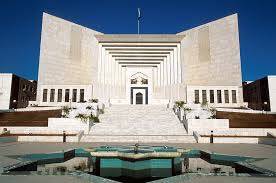SBC to challenge Official Secrets Act and Army Act in SC
Shares

The Sindh Bar Council (SBC) took a significant step on Wednesday when it approached the Supreme Court to challenge the trial of civilians in military courts. Simultaneously, it raised objections against two recent legislative acts: the Pakistan Army (Amendment) Act, 2023 and the Official Secrets (Amendment) Act, 2023. These developments follow closely on the heels of a controversy initiated by President Dr. Arif Alvi, who claimed not to have signed these bills, attributing the confusion to his staff's actions. This revelation sent the country into a state of turmoil.
President Alvi vehemently denied his endorsement of the two bills through a social media post. However, he did admit that his staff failed to return the bills to parliament within the 10-day timeframe stipulated by Article 75 of the Constitution. He accused his staff not only of deceiving him but also of undermining his authority by concealing the fact that the bills had not been returned.
In its petition, the SBC argued that charging accused individuals under the Official Secrets Act 1923 and the Pakistan Army Act 1952 in relation to acts of violence during the May 9 and 10 attacks throughout Pakistan is not only unconstitutional but also beyond the scope of these acts. It characterized this action as an exercise of power without jurisdiction.
The petitioner urged the court to declare that the trial of civilians under military laws and before military tribunals violates the Constitution and Pakistan's international treaty and convention obligations. Such trials, it contended, cannot be justified under any circumstances. The petition specifically sought the annulment of Sections 2(d), 59(4), and 94 of the Pakistan Army Act 1952, Sections 2(dd), 71(3), and 123 of the Pakistan Air Force Act 1953, and Sections 2(3), 78(3), and 107 of the Pakistan Navy Ordinance 1961.
Furthermore, the petition argued that the purported Pakistan Army (Amendment) Act 2023 and the purported Official Secrets (Amendment) Act, 2023 lacked presidential assent under Article 75(1) of the Constitution and should be considered null and void. Alternatively, it called on the court to declare these acts as "ultra vires" the Constitution, emphasizing that they extend the reach of military laws and military tribunals over civilians, including retired military personnel, and are therefore legally ineffective.
